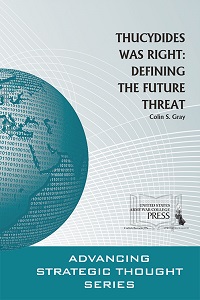
Εισαγωγικό σημείωμα του Παναγιώτη Ήφαιστου: O Colin Gray είναι αναμφίβολα ένας από τους σημαντικότερους σύγχρονους αναλυτές της στρατηγικής. Η ειδοποιός διαφορά ως στοχαστής της στρατηγικής θεωρίας σε σύγκριση με άλλους έγκειται στο γεγονός πως όχι μόνο έχει κινηθεί επιδέξια σε όλο το φάσμα της στρατηγικής ανάλυσης αλλά έχει επίσης διατελέσει σε θέσεις ευθύνης. Επί προεδρίας Ρήγκαν ήταν ένας από τους βασικούς στρατηγικούς εγκεφάλους του τότε προέδρου. Το έργο του συνήθως διακρίνεται σε εκείνα τα κείμενα που εμπίπτουν στα πεδία των προτάσεων πολιτικής (τα οποία λογικά στηρίζουν την μια ή άλλη άποψη του κράτους τους) και εκείνων που είναι σχεδόν αμιγώς επιστημονικά. Έχει γράψει για γεωπολιτική, ήταν ένας από τους κύριους θεωρητικούς στην συζήτηση των σκοπών της στρατηγικής στην εποχή των πυρηνικών όπλων σε αναφορά με τον Clausewitz, έχει γράψει έξοχα κείμενα για την στρατηγική κουλτούρα και έχει εποπτεία των ευρωατλαντικών όσο λίγοι (είναι διπλής εθνικότητας, Άγγλος και Αμερικανός). Το κείμενό του «Thucydides was right: Defining the future threat» γράφεται σε μια ώριμη φάση της διαδρομής του και συνιστά σύνεση και προσοχή όπως κάθε άλλος συνεπής με τη Θουκυδίδεια παράδοση. Το βιβλίο αυτό αξίζει να διαβαστεί με προσοχή από όποιον ενδιαφέρεται για την σύγχρονη στρατηγική σκέψη σε συνάρτηση με τις εν εξελίξει στρατηγικές σχέσεις του 21 αιώνα.
Είναι σημαντικό πάντως ότι ένας από τους σημαντικούς αναλυτές γεωπολιτικής της Δύσης προειδοποιεί ότι μια γεωπολιτική προσέγγιση της Ρωσίας με την Κίνα θα είναι μια κατάσταση την οποία οι Αμερικανοί δεν θα μπορούν να αντιμετωπίσουν. Αυτό ενέχει μεγάλη σημασία καθότι οι ερασιτεχνισμοί στην κεντρική Ευρώπη αυτό «κατορθώνουν» οδηγώντας το πλανητικό σύστημα σε κατάσταση παρατεταμένων ανακατανομών ισχύος με απρόβλεπτες συνέπειες. Να θυμίσω ότι αυτό υποστήριξαν σημαίνοντες αναλυτές της στρατηγικής όπως ο Κίζινγκερ και Mearsheimer τις παρεμβάσεις των οποίων έχουμε ήδη σχολιάσει παραθέτοντας ταυτόχρονα τις δικές μας θέσεις. Τέλος, πρέπει να πούμε ότι η ελληνική διπλωματία των τελευταίων μηνών κινείται προσεκτικά λαμβάνοντας υπόψη αυτές τις πτυχές. Με διαφορετικά λόγια, είναι ένα ζήτημα που αφορά άμεσα την ελληνική εξωτερική πολιτική.
Brief Synopsis
To define future threat is, in a sense, an impossible task, yet it is one that must be done. The only sources of empirical evidence accessible are the past and the present; one cannot obtain understanding about the future from the future. The author draws upon the understanding of strategic history obtainable from Thucydides’ great History of the Peloponnesian War. He advises prudence as the operating light for American definition of future threat, and believes that there are historical parallels between the time of Thucydides and our own that can help us avoid much peril. The future must always be unpredictable to us in any detail, but the many and potent continuities in history’s great stream of time can serve to alert us to what may well happen in kind.
Strategic Studies Institute
and
U.S. Army War College Press
THUCYDIDES WAS RIGHT:
DEFINING THE FUTURE THREAT
Colin S. Gray
April 2015
The views expressed in this report are those of the author and do not necessarily reflect the official policy or position of the Department of the Army, the Department of Defense, or the U.S. Government. Authors of Strategic Studies Institute (SSI) and U.S. Army War College (USAWC) Press publications enjoy full academic freedom, provided they do not disclose classified information, jeopardize operations security, or misrepresent official U.S. policy. Such academic freedom empowers them to offer new and sometimes controversial perspectives in the interest of furthering debate on key issues. This report is cleared for public release; distribution is unlimited.
*****
This publication is subject to Title 17, United States Code, Sections 101 and 105. It is in the public domain and may not be copyrighted.
*****
Comments pertaining to this report are invited and should be forwarded to: Director, Strategic Studies Institute and U.S. Army War College Press, U.S. Army War College, 47 Ashburn Drive, Carlisle, PA 17013-5010.
*****
This manuscript was funded by the U.S. Army War College External Research Associates Program. Information on this program is available on our website, www.StrategicStudies Institute.army.mil, at the Opportunities tab.
*****
 All Strategic Studies Institute (SSI) and U.S. Army War College (USAWC) Press publications may be downloaded free of charge from the SSI website. Hard copies of this report may also be obtained free of charge while supplies last by placing an order on the SSI website. SSI publications may be quoted or reprinted in part or in full with permission and appropriate credit given to the U.S. Army Strategic Studies Institute and U.S. Army War College Press, U.S. Army War College, Carlisle, PA. Contact SSI by visiting our website at the following address: www.StrategicStudiesInstitute.army.mil.
All Strategic Studies Institute (SSI) and U.S. Army War College (USAWC) Press publications may be downloaded free of charge from the SSI website. Hard copies of this report may also be obtained free of charge while supplies last by placing an order on the SSI website. SSI publications may be quoted or reprinted in part or in full with permission and appropriate credit given to the U.S. Army Strategic Studies Institute and U.S. Army War College Press, U.S. Army War College, Carlisle, PA. Contact SSI by visiting our website at the following address: www.StrategicStudiesInstitute.army.mil.
*****
The Strategic Studies Institute and U.S. Army War College Press publishes a monthly email newsletter to update the national security community on the research of our analysts, recent and forthcoming publications, and upcoming conferences sponsored by the Institute. Each newsletter also provides a strategic commentary by one of our research analysts. If you are interested in receiving this newsletter, please subscribe on the SSI website at www.StrategicStudiesInstitute.army.mil/newsletter.
ABOUT THE AUTHOR
COLIN S. GRAY is Professor of International Politics and Strategic Studies at the University of Reading, England. He worked at the International Institute for Strategic Studies in London, UK, and at the Hudson Institute in Croton-on-Hudson, NY, before founding the National Institute for Public Policy, a defense-oriented think tank in the Washington, DC, area. Dr. Gray served for 5 years in the Ronald Reagan administration on the President’s General Advisory Committee on Arms Control and Disarmament. A dual citizen of the United States and UK, he has served as an adviser to both the U.S. and British governments. His government work has included studies of nuclear strategy, arms control, maritime strategy, space strategy, and special forces. Dr. Gray has written 27 books, including: The Sheriff: America’s Defense of the New World Order (University Press of Kentucky, 2004); Another Bloody Century: Future Warfare (Weidenfeld and Nicolson, 2005); Strategy and History: Essays on Theory and Practice (Routledge, 2006); Fighting Talk: Forty Maxims on War, Peace and Strategy (Potomac Books, 2009); National Security Dilemmas: Challenges and Opportunities (Potomac Books, 2009); The Strategy Bridge: Theory for Practice (Oxford University Press, 2010); War, Peace and International Relations: An Introduction to Strategic History, 2nd Ed. (Routledge, 2011); Airpower for Strategic Effect (Air University Press, 2012); Perspectives on Strategy (Oxford University Press [OUP] 2013), which is the follow-on to Strategy Bridge. The final volume in the Strategy Bridge trilogy, entitled Strategy and Defence Planning: Meeting the Challenge of Uncertainty, was published by OUP in 2014. Dr. Gray is a graduate of the Universities of Manchester and Oxford.
Για να διαβάσετε ολόκληρο το κείμενο κάντε κλικ εδώ: Thucydides was right: Defining the Future Threat (αρχείο Pdf).



